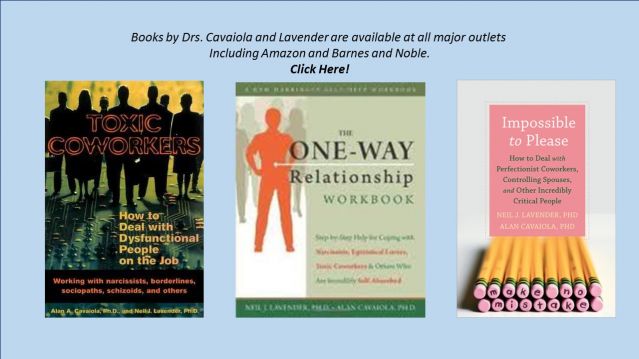Career
Is It Natural to Hate Work?
Is it just natural for us to hate our jobs?
Posted September 15, 2015
Is it Natural to Hate Work?
Dr. Alan Cavaiola

A recent New York Times article (August 30, 2015) by Barry Schwartz, a psychology professor from Swarthmore College, raises the question of whether it’s just part of human nature to hate one’s job. In his article entitled, “Rethinking Work,” Professor Schwartz explores areas of jobs satisfaction. For example, he quotes recent surveys that estimate 90 percent of workers are either “not engaged” or “actively disengaged” from their jobs. In other words most employees spend “half of their waking lives doing things they really don’t want to do in places they don’t particularly want to be” according to Schwartz. The article goes on to explain that most workplaces are structured in such a way as to constantly monitor work output, given that most workers find no intrinsic value in their jobs other than getting paid. Schwartz goes on to propose that ideally most workers do want jobs that are challenging and want to work with administrators who respect them and whom they respect. When I’ve written about “healthy workplaces” in previous blogs, I outlined some of the things that make for a more satisfying workplace which are similar to those put forth by Professor Schwartz. Also, consider those instances where people leave cushy jobs to find more fulfilling work, (e.g. doctors who leave lucrative practices to work in clinics that serve the disadvantaged). We have many graduate students in our counseling programs who had successful business careers which they left in order to do something where they can make a difference in people’s lives).
Schwartz refers to a study done by Amy Wrzesniewski and colleagues at Yale University where they surveyed custodians working in medical centers. Although their job descriptions never mentioned interacting with patients, many of the custodians found the most fulfilling part of their job was assisting professional staff by calming patients, joking with them, reassuring family members, calming patients so that nurses could insert IVs etc. Their perception of “patient care” is not compensated in any way, yet the custodians reported that they found this to be an essential part of their jobs. Schwartz concludes that workers are not lazy, shiftless individuals who look for every opportunity to avoid work (although we can probably all think of a co-worker who fit this description), but rather that most workers seek opportunities to make a difference or to make their work more fulfilling. He concludes that many individuals start off in their occupations being enthusiastic about a “variety of aspirations” that go beyond the paycheck, but eventually they find out that other factors take precedence over those aspirations. He gives examples of the teacher who starts off wanting to educate kids but then learns the only thing that matters are test scores, or the attorney who aspires to help people receive justice only to find that the only thing that counts are “billable hours” or the doctor or nurse who also aspires to help heal people only to find that what matters is cutting corners in order to stay within the dictates of managed care/health insurance companies rather than rendering adequate, needed care. Schwartz points out that without a doubt, workers should be adequately compensated for their hard work (including raising the minimum wage), however, he also advocates for companies and organizations to really take a hard look at how they treat their employees, as there are many other ways to compensate people than monetarily. In other words, there are other ways to engage workers.
As I was reading Schwartz’s article however, I couldn’t help to think about Linda Tirado’s recently released book entitled, Hand to Mouth: Living in Bootstrap America and the types of soul-crushing, demeaning jobs she works at just to survive. Her life is not one of luxuries, vacations, or other extravagances. On the contrary, she describes foregoing much needed dental work because of not being able to afford going to a dentist. Concepts such as work fulfillment, job satisfaction or work engagement is so antithetical to Linda’s work experiences. As she so aptly describes, “As far as I’m concerned, I earn my wages with my scars. Anything above and beyond that is me doing my employers a favor. And I’m not inclined to do favors for people who treat me poorly. See we work in insane conditions. Dangerous even.” (pg 15) She goes on to explain “Whenever you are working for the kind of place that has a corporate office, you’re typically given the fewest possible hours—definitely less than full-time, because then they’d have to pay you benefits.” (pg 19) It’s hard to imagine any employee being “engaged” or “fulfilled” or having much chance of experiencing job satisfaction or corporate loyalty in the types of low-wage, dead-end jobs that Tirado describes. I highly recommend her book.
Tirado, L. (2014). Hand to Mouth: Living in Bootstrap America. New York: Putnam



